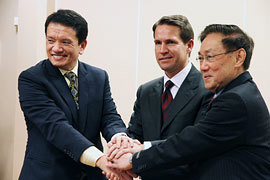The Philippines – successful first round of talks in Norway
Historical archive
Published under: Stoltenberg's 2nd Government
Publisher: Ministry of Foreign Affairs
News story | Date: 22/02/2011
On Monday 21 February, a successful first round of talks between the Philippine authorities and the communist movement was completed in Norway. These were the first formal talks between the parties since 2004.
On Monday 21 February, a successful first round of talks between the Philippine authorities and the communist movement was completed in Norway. These were the first formal talks between the parties since 2004.
Formal talks between the communist movement – the National Democratic Front of the Philippines (NDFP) – and the Philippine authorities were last held as long ago as 2004. The round of talks that has just been completed in Norway is therefore regarded as a significant breakthrough and a major step forward for the peace process.
Picture from left: Alex Padilla, Chair GPH,
Ture Lundh, Luis Jalandoni, Chair NDFP.  After seven days of intense and tough talks at Holmen Fjordhotell outside Oslo, the parties finally managed to reach agreement on a joint statement on 21 February. The statement sets out that the parties agree to an ambitious timetable for further talks. With Norway as facilitator, the parties envisage drawing up partial agreements on substantial themes including social, economic, political and constitutional reforms over the next 12–18 months. They also consider it possible to reach a final peace agreement during the course of the next three years.
After seven days of intense and tough talks at Holmen Fjordhotell outside Oslo, the parties finally managed to reach agreement on a joint statement on 21 February. The statement sets out that the parties agree to an ambitious timetable for further talks. With Norway as facilitator, the parties envisage drawing up partial agreements on substantial themes including social, economic, political and constitutional reforms over the next 12–18 months. They also consider it possible to reach a final peace agreement during the course of the next three years.
Both parties expressed gratitude for the part the Norwegian authorities are playing in facilitating the process, leading the talks, acting as host and patiently supporting the peace process in the Philippines. The Norwegian authorities emphasised their full support for the negotiating parties and for the peace process as such, and this was further underlined by the presence of both Foreign Minister Jonas Gahr Støre and State Secretary Espen Barth Eide at the formal round of talks. Although these talks were an important step forward for the peace process, it is important to have realistic expectations. The parties face difficult and complex challenges. Norway will continue to assist the parties in the ongoing negotiations.
Background – the peace process
For more than 40 years, the communist movement has been engaged in armed conflict to bring about a change of government in the Philippines. Despite a number of peace initiatives, it was not possible to establish a formal framework for negotiations until 1992. This resulted in the signing of the Hague Joint Declaration, which sets out that peace talks are to be completed in a specific sequence linked to specific themes: human rights, social and economic reforms, and political and constitutional reforms.
In 2001, Norway was asked to act as facilitator to assist the peace process as the parties needed the support of a neutral third party. Three rounds of talks were held in Oslo in 2004. These led to the establishment of the Joint Monitoring Committee (JMC), which is responsible for monitoring violations of human rights. A fourth round of talks, which was planned in 2004, was postponed indefinitely by the NDFP in response to what was perceived as the Philippine authorities’ active role in the inclusion of the communist movement’s military wing – the New People’s Army, the Communist Party of the Philippines (CPP) and the movement’s assumed leader, Professor Jose Maria Sison, on the EU and US terrorist lists.
Since the breakdown in the negotiations in 2004, Norway has been engaged in shuttle diplomacy between the parties to persuade them to return to the negotiating table. In the middle of January 2011, informal talks between the parties were held in Norway. There has been new momentum in the peace process over the last six months; important factors have been the presidential election last summer, which brought in new actors representing the Philippine authorities, and frequent consultations between Norway and the parties. At the informal meeting in January, the parties agreed to restart formal talks and to enter into a ceasefire for the period of formal talks, 15–21 February.